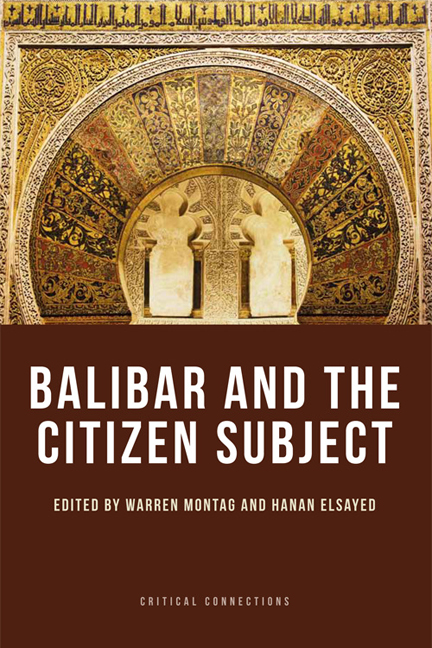Book contents
- Frontmatter
- Contents
- Introduction: Balibar and the Citizen Subject
- Part I Balibar Reading Schmitt Reading Hobbes: Equality or Similitude?
- Part II Transindividual/Universal
- 3 The “Other Scene” of Political Anthropology: Between Transindividuality and Equaliberty
- 4 Intersubjectivity or Transindividuality: The Leibniz– Spinoza Alternative
- 5 A Parallelism of Consciousness and Property: Balibar's Reading of Locke
- 6 Figures of Universalism: Notes on Philosophy and Politics in Etienne Balibar
- 7 Balibar and the Philosophy of Science: The Question of the “Epistemological Break”
- Part III Inequality, Violence and the Possibility of Citizenship
- Notes on Contributors
- Index
6 - Figures of Universalism: Notes on Philosophy and Politics in Etienne Balibar
from Part II - Transindividual/Universal
Published online by Cambridge University Press: 10 January 2018
- Frontmatter
- Contents
- Introduction: Balibar and the Citizen Subject
- Part I Balibar Reading Schmitt Reading Hobbes: Equality or Similitude?
- Part II Transindividual/Universal
- 3 The “Other Scene” of Political Anthropology: Between Transindividuality and Equaliberty
- 4 Intersubjectivity or Transindividuality: The Leibniz– Spinoza Alternative
- 5 A Parallelism of Consciousness and Property: Balibar's Reading of Locke
- 6 Figures of Universalism: Notes on Philosophy and Politics in Etienne Balibar
- 7 Balibar and the Philosophy of Science: The Question of the “Epistemological Break”
- Part III Inequality, Violence and the Possibility of Citizenship
- Notes on Contributors
- Index
Summary
My intention here is to trace the ways in which the confrontation between the problematic of universalism in its internal diversity and the reality of anthropological difference has determined the part of Etienne Balibar's oeuvre that remains a work in progress. The course he has taken in his works and the continuous movement of his ideas together reveal the essential articulations of his philosophical meditations. The impressive range of his texts is equaled by his desire to confront both the blind spots of classical political theories and the inescapable problems posed by the contemporary situation. The perpetual motion proper to his approach undermines any attempt to identify a given demarcation in the development of his work over the long term as a decisive or irreversible turning point. It brings out, among other things, the problematizations that correspond to “what might be understood as a ‘contemporary confrontation’ with the heritage of Marx and Marxism.” It is undoubtedly necessary to point out that he has never ceased to rework or rectify (without any renunciation of this activity) the “marxological,” Marxist and Althusserian foundation of his thought. Is it then a question of self-criticism? Not really, since it is less a repudiation than a matter of re-investigating and extending this foundation based on his desire to found or refound the theory of the political in the light of new “historical figures of emancipation.” His project is thus reaffirmed: to face the “essentially ‘contested’ character of political philosophy” for the explicit purpose of renewing the “dynamics of the political” through this contestation itself. The result has been an impressive and essential oeuvre. And, if it were not unseemly and presumptuous to describe his theoretical development, we would have to acknowledge that if Balibar were not speaking of Hannah Arendt in the following passage, we might have seen it as a case of de te fabula narrator:
Every great work has its history, both interior and exterior. It reflects a development characterized by powerful continuities, by the recurrence of obsessive questions on which the very expansion of the philosophical horizon and the movements of his analysis depend.
- Type
- Chapter
- Information
- Balibar and the Citizen Subject , pp. 182 - 202Publisher: Edinburgh University PressPrint publication year: 2017



